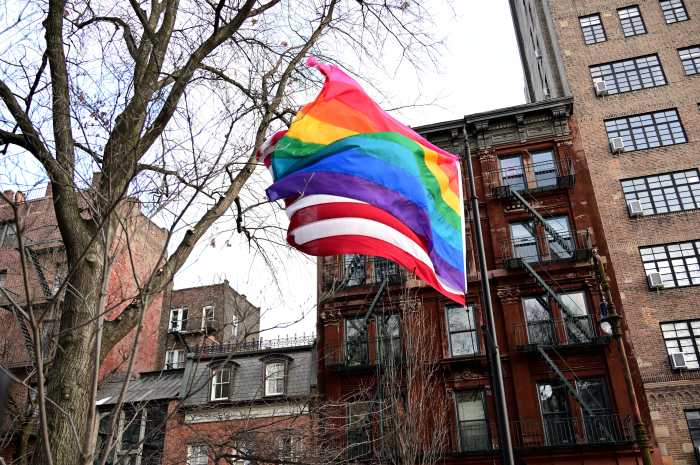Edie Windsor (r.), with her late spouse Thea Spyer. | NYCLU.ORG
Both the Defense of Marriage Act and the Proposition 8 cases set for argument before the US Supreme Court in late March present questions of equal protection and — at the high court’s direction — of federal jurisdiction, as well. Most of the speculation I’ve seen assumes the court will produce a majority decision in the DOMA and Prop 8 litigation, but I’ve been thinking that the addition of the jurisdictional questions sets up the possibility there will be no one opinion representing the views of the court in one or both.
For example, in the Prop 8 litigation, it is possible that several members of the court — but not a majority — will agree that the amendment’s Official Proponents, who have defended it in the absence of California’s governor or attorney general doing so, lack standing to appeal the district court’s decision.
Let’s assume that three or four members of the court take this view and that the remaining five or six are split between those who would affirm either the Ninth Circuit or the district court striking down Prop 8 on the merits and those who would reverse one or both on the merits. That would mean no majority opinion. In that case, I would argue, Prop 8 is dead and same-sex couples could once again marry in California.
No national precedent would be set in such a scenario, even for situations in which more or less the exact same fact pattern — marriage rights being taken away after they have already existed — were to recur.
Jurisdictional questions posed by Supreme Court could play havoc
DOMA and the jurisdictional questions the high court posed there may make for even greater complication. Among a number of petitions for review of DOMA litigation, the Supreme Court accepted the one from the Solicitor General’s Office seeking review of the trial court’s ruling against DOMA in the lawsuit brought by New York widow Edie Windsor. That court found that DOMA did not survive even the most deferential level of judicial scrutiny — rational basis review.
Subsequent to the solicitor general filing his petition, however, the Second Circuit Court of Appeals upheld the district court’s ruling, but found that equal protection challenges based on sexual orientation discrimination claims must be subjected to heightened scrutiny, which imposes a stiffer burden in defending a statute. Theoretically, the Second Circuit’s subsequent ruling is not the decision about which the high court granted the petition for review, and it might even choose to ignore it — or some members might choose to do so — to avoid the thorny question of whether sexual orientation discrimination claims merit heightened scrutiny if they can rule in Windsor’s favor by instead affirming the district court’s decision.
The high court has appointed Vicki Jackson, a noted Harvard Law School professor, to argue on the several jurisdictional questions it has raised. The first is whether the solicitor general, in petitioning the court to affirm the district court’s decision, is presenting a true “case or controversy” — typically required when judicial review is sought. Here, there’s an interesting twist. There is, in fact, a controversy: Prior to deciding that sexual orientation claims merit heightened scrutiny, the Department of Justice had argued that DOMA would be held constitutional when analyzed using a rational basis standard. Is that disagreement between the district court and DOJ sufficient to satisfy the Supreme Court that it can find the required “controversy” in this case — and if so, is the high court essentially challenging the administration to reaffirm that it still holds to its earlier view on the rational basis for DOMA?
The other jurisdictional question in the DOMA case is whether the Bipartisan Legal Advisory Group (BLAG) of the House of Representatives — which Speaker John Boehner controls on a 3-2 party-line vote — has standing to appeal the district court’s ruling. The solicitor general likely filed his petition in the case to preserve the Supreme Court’s jurisdiction, since there might be some question about BLAG’s independent standing.
The House, it should be noted, took no vote to authorize intervention at the time BLAG filed its petition for review. Perhaps in response to concern over that, one of the Republican majority’s first orders of business in the new Congress convened earlier this month was to change House rules to designate BLAG as speaking in the name of the House. Does that retroactively take care of the standing problem in the minds of those justices who asked that this jurisdictional question be addressed?
Now to the question of what happens if the court splinters on DOMA without a majority decision. Suppose three or four justices find the solicitor general has shown no case or controversy and that BLAG lacks standing, while three or four vote to reverse the ruling against DOMA on the merits and two or more are willing to affirm that the law is unconstitutional even on a rational basis analysis. There would be no majority on the merits, but where would that leave the case? With a district court decision that wasn’t appealed and, therefore, affirmed de facto? Does Edie Windsor get her tax refund? If the district court ruling were binding on the IRS, to what extent would it be binding on anybody else?
And, would the Obama administration construe that result as sufficient to justify abandoning the enforcement of DOMA’s Section 3, which bars federal recognition of marriages by same-sex couples? Recall that until now, its position has been that Section 3 is unconstitutional but will be enforced unless the Supreme Court strikes it down or Congress repeals it.
If the deadlocked scenario on the high court described above comes to pass, clear-cut resolution might only come from a situation in which another DOMA challenge proceeds to a circuit court of appeals, where BLAG achieves a reversal, and then the LGBT plaintiff group files a petition for review to the Supreme Court. That would get rid of jurisdictional problems.
A majority of the court, of course, could well get to the merits and rule one way or the other on either or both of these cases. If a majority of the court disagrees with the rational basis analyses that the district courts applied in striking down DOMA and/ or Prop 8, the level of judicial review appropriate to sexual orientation discrimination claims would become the big battleground on the merits. That’s an issue the high court has evaded in the past, but the delay in taking that on may be running out of time.






































